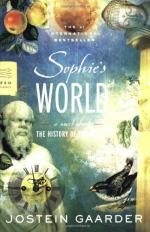|
This section contains 747 words (approx. 2 pages at 400 words per page) |

|
Sophie's World Summary & Study Guide Description
Sophie's World Summary & Study Guide includes comprehensive information and analysis to help you understand the book. This study guide contains the following sections:
This detailed literature summary also contains Topics for Discussion and a Free Quiz on Sophie's World by Jostein Gaarder.
Sophie is a girl approaching her 15th birthday. She encounters first some odd philosophical questions and then the first chapter of a written philosophy course in her mailbox. Sophie starts to learn about the historical beginnings of philosophy. At the same time, Sophie is curious who is giving her this course. Sophie also begins to receive postcards addressed to Hilde, a girl also approaching her 15th birthday, from Hilde's father Albert Knag, a Norwegian Major in the UN Force in Lebanon.
Sophie gets a thorough education in Greek and Hellenistic philosophy, but things begin to become strange. The videotape that Sophie gets not only has the philosopher Alberto Knox in Athens at the Acropolis, but someone on the Acropolis is holding up a banner that reads "Hilde." There is actually an appearance by someone claiming to be Plato himself. At this time, Sophie is introduced to her philosophy teacher, Alberto Knox.
Later, Sophie follows the philosophy teacher's dog to his cabin and sees a mirror, where a girl winks back at Sophie. Soon after, Sophie gets a telephone call from Alberto to meet him in a church for a lesson on the Middle Ages. They have to intensify the course, because Hilde's father, the Major is coming home soon, Sophie is told. It becomes more and more clear that the Major has supernatural powers over Sophie and her world. Finally, after a class on the British philosopher George Berkeley, it becomes clear that Alberto, Sophie and all the other people in the story are characters in a book composed in the mind of the Major.
At this point, Sophie threatens to abandon the course, but Alberto encourages her to finish the course and then escape from the Major. Berkeley's philosophy, which Sophie has just studied, assures Sophie that sensual perceptions only exist in the mind of the perceiver. She comforts herself with the idea that just as she and Alberto are characters in a philosophy book, the Major and Hilde themselves could be also characters in a book. From the standpoint of Berkeley, it can even be argued that Sophie and Alberto are just as real as the Major and Hilde. This philosophical game foreshadows the point at the end of the book, where the positions of the characters in terms of perception are changed.
The reader is introduced to Hilde, a young girl of Sophie's age, with the same birth date. Hilde is totally involved in reading the philosophy book about Sophie and Alberto. Hilde is thrilled that her father has written this book for her, yet she becomes annoyed in how her father is treating the characters Sophie and Alberto. Due to such things as Hilde missing her crucifix, and Sophie finding it in the story, Hilde begins to believe that Sophie and Albert somehow really exist.
There is also added tension between Sophie and her mother. Sophie's mother thinks Sophie is in trouble with a boy or man or going crazy. However, Sophie calms the mother down by telling her that the mother will meet the philosopher at the party they are holding on Mid Summer Eve. This is a combination party for Mid Summer Eve and for Sophie's 15th birthday that happens a week earlier. Meanwhile, the philosophy course goes through Descartes, Hegel, Marx, Darwin and other philosophers, through Jean Paul Sartre, the existentialist. The existentialist philosophy, too, urges Alberto and Sophie to create their own meaning.
The Midsummer Eve Party is renamed the Philosophical Garden Party, and boys, girls, Alberto Knox the philosopher and others are invited. The party rapidly degenerates into existentialist chaos but not before giving a chance for Alberto and Sophie to escape the Major's attention and his book. However, we still hear about how they are now part of the invisible people. Hilde is angered at the tricks that her father played on Sophie and Alberto and plays some tricks of her own on him as he flies home to Norway. Finally, the Major comes home to his daughter, Hilde, while Sophie and Alberto watch, now invisible to them. Before the Major is able to see them, but he now could not see them, so the position of sensual perceptions has turned around. On Midsummer Eve, the Major and Hilde have one last discussion of the nature of the universe. In this way, the book is a philosophy course and also a story of intrigue and development of two girls in two different worlds.
Read more from the Study Guide
|
This section contains 747 words (approx. 2 pages at 400 words per page) |

|



